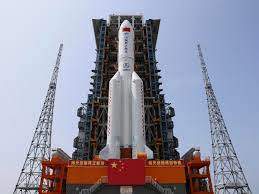What Goes Up Must Come Down — Including A Giant Chinese Rocket Plunging Toward Earth

There's a giant Chinese rocket booster hurtling toward the planet, and no one seems to know exactly when or where it's going to land.
The U.S. Space Command said it is tracking the whereabouts of the Chinese Long March 5B, a 23-ton piece of space debris, but that the exact entry point into Earth's atmosphere cannot be pinpointed until hours before its reentry, which is expected sometime around Saturday.
"We're tracking it. We're following it as closely as we can. It's just a little too soon right now to know where it's going to go or what if anything can be done about that," spokesman John Kirby told reporters earlier this week.
"I don't want to hypothesize or speculate about possible actions the department might or might not take here," Kirby added.
Under international guidelines, rockets are supposed to descend to Earth in a controlled way — typically "guided remotely using the last of its fuel to land in a specific, remote bit of ocean," according to LiveScience.
Space.com reports that the booster began its journey into space as recently as April 28, when it was used to launch the core module of China's new T-shaped space station into orbit.
Despite its size as one of the 10 largest objects to ever reenter Earth's atmosphere, scientists say it's unlikely that the now-uncontrolled booster will actually hit someone. Given the fact that most of the planet is covered in water, there's about a 70% chance the debris will fall into an ocean.
But that doesn't mean there's no risk for humans. In May 2020, another Long March 5B "became the heaviest orbiting thing to fall uncontrolled to Earth in nearly three decades," according to LiveScience. In that instance, the rocket crashed into the Atlantic Ocean and across some of West Africa, possibly damaging an inhabited village in Côte d'Ivoire.
The White House on Wednesday addressed the falling Chinese space junk, which is not the first to come plummeting out of the sky.
"The United States is committed to addressing the risks of growing congestion due to space debris and growing activity in space," White House press secretary Jen Psaki told reporters.
Psaki added: "We want to work with the international community to promote leadership and responsible space behaviors. It's in the shared interests of all nations to act responsibly in space to ensure the safety, stability, security and long-term sustainability of outer space activities."
In the meantime, the 18th Space Control Squadron will be offering daily updates to the rocket body's location on Space-track.org.
Photo: "We're tracking it. We're following it as closely as we can. It's just a little too soon right now to know where it's going to go or what if anything can be done about that," a U.S. Space Command spokesman told reporters.
Guo Wenbin/AP
Link: https://www.npr.org/2021/05/06/994488168/what-goes-up-must-come-down-including-a-giant-chinese-rocket-plunging-toward-ear




